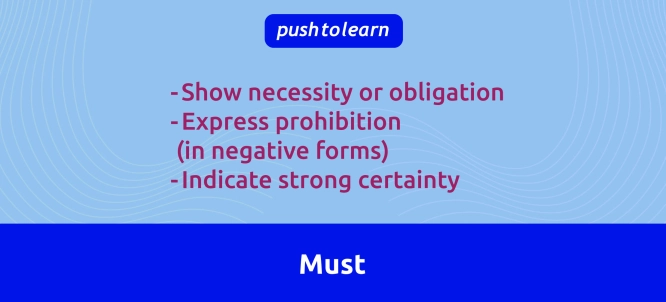by PushtoLearn
Modal Verb Must
Table of Contents
Modal Verb Must – Exercises
These exercises focus on Must
What is Must?
"Must" is a modal verb used to:
-
Show necessity or obligation
-
Express prohibition (in negative forms)
-
Indicate strong certainty
Like all modal verbs, "must" is followed by the base form of the main verb.

Uses of Must
1. Necessity or Obligation
Use "must" to talk about something that is necessary or required.
Examples:
-
You must wear a seatbelt in the car.
-
Students must complete their homework on time.
2. Prohibition
In negative sentences, "must not" (or "mustn’t") is used to express something that is forbidden.
Examples:
-
You mustn’t smoke in the hospital.
-
We mustn’t enter this area without permission.
3. Strong Certainty
Use "must" to express a strong belief or conclusion based on evidence.
Examples:
-
He must be the new teacher; he’s sitting at the teacher’s desk.
-
You must be tired after such a long journey.
Rules for Using Must
-
"Must" is always followed by the base form of the verb (without "to").
✅ Correct: You must finish the report today.
❌ Incorrect: You must to finish the report today. -
The negative form is "must not" or "mustn’t."
✅ Correct: You mustn’t use your phone in class.
❌ Incorrect: You don’t must use your phone in class. -
"Must" does not change with the subject.
✅ Correct: She must study. / They must study.
❌ Incorrect: She musts study.
Common Errors with Must
|
Error |
Why It’s Wrong |
Correct Form |
|
You must to listen to me. |
"To" is not needed after "must." |
You must listen to me. |
|
He musts finish the work. |
"Must" does not take an "s." |
He must finish the work. |
|
We don’t must be late. |
Use "mustn’t" instead of "don’t must." |
We mustn’t be late. |
|
Must you to leave early? |
"To" is not needed in questions. |
Must you leave early? |
Everyday Use of Must
|
Situation |
Example Sentence |
|
Talking about rules |
You must show your ID at the door. |
|
Prohibiting something |
You mustn’t park here; it’s illegal. |
|
Expressing certainty |
She must be excited about her promotion. |
|
Giving advice formally |
You must visit the museum; it’s amazing! |
Difference Between Must and Similar Modal Verbs
|
Modal Verb |
Use |
Example |
|
Must |
Strong necessity or certainty |
You must stop at the red light. |
|
Have to |
Necessity (more common in conversation) |
You have to wear a uniform. |
|
Should |
Suggestion or advice |
You should exercise more. |
FAQ About Must
Can "must" be used in the past?
No, for the past, use "had to" instead.
Example: I had to work late yesterday.
What’s the negative form of "must"?
The negative form is "must not" or "mustn’t."
Example: You mustn’t speak during the exam.
What’s the difference between "must" and "have to"?
Both express necessity, but "must" is often stronger and more formal. "Have to" is more common in everyday conversation.
Example: You must be on time for the meeting (formal). / You have to finish this by tomorrow (everyday speech).
How do you form a question with "must"?
Place "must" at the beginning of the question.
Example: Must I submit the form today?
Is "must" formal or informal?
"Must" is generally more formal than "have to" but can be used in both formal and informal situations.

